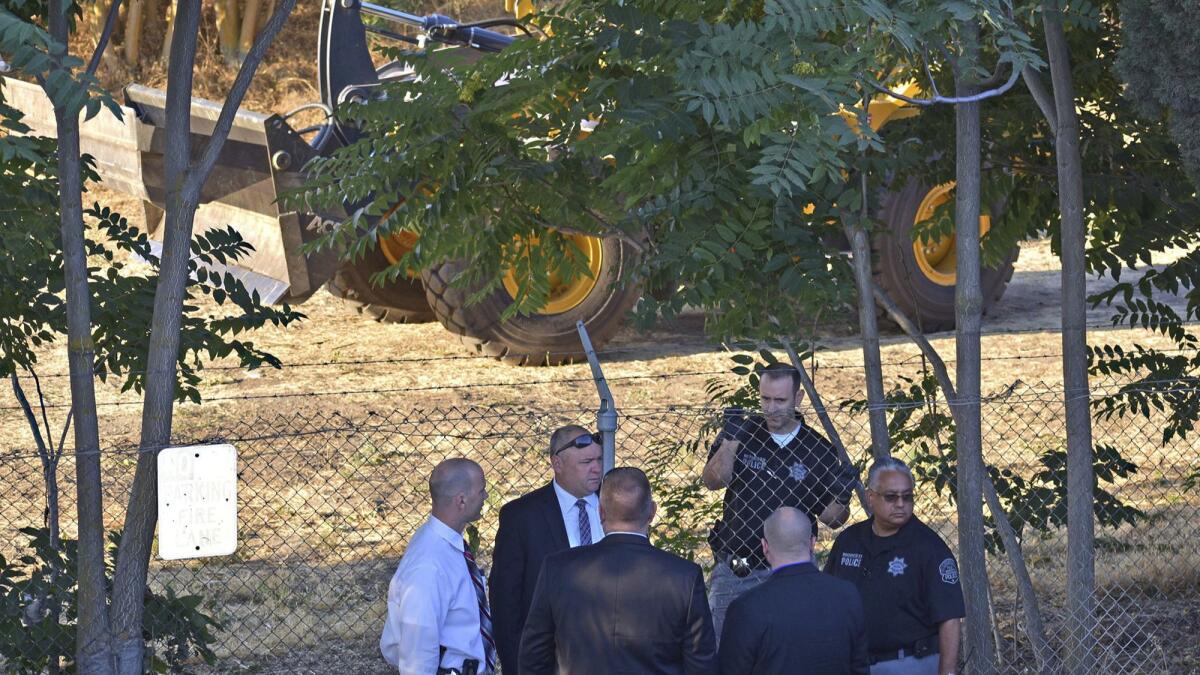Woman killed as Caltrans crew clears homeless encampment in Modesto

- Share via
A 33-year-old woman sleeping in cardboard box in a homeless camp died this month after she was struck by machinery used by a California Department of Transportation crew to bulldoze the area.
Shannon Marie Bigley’s last known address was in Stockton, but police said prior to her death on Aug. 1, she had set up camp in a grassy field where homeless people frequently sleep alongside Highway 99 south of Kansas Avenue. A Caltrans crew operating a front loader was clearing the area that day.
California Highway Patrol Officer Thomas Olsen said the department’s multidisciplinary accident investigation team is still trying to determine how Bigley died. It is not clear when the investigation will be complete.
“We owe it to the family members and the victim to do a proper investigation,” Olsen said. “We’re not going to rush anything.”
A man who said he witnessed the incident told a reporter at the encampment that her body was “smashed.”
The woman’s death also renewed lingering tensions among Caltrans workers, who have been tasked with cleaning up dozens of homeless encampments across the state.
The union representing Caltrans workers on Wednesday filed a formal complaint with the agency highlighting health and safety concerns related to the practice, which workers contend should not be part of their duties.
“As we have said before, Caltrans is putting our members and the public at risk by requiring them to perform these homeless encampment cleanup duties,” Steve Crouch, director of public employees for Local 39 of the International Union of Operating Engineers, wrote in the complaint.
Caltrans did not immediately respond to a request for comment Thursday.
“Our sympathies go out to the family of the woman who was found earlier this month during an encampment cleanup along State Route 99 in Modesto,” the agency wrote in a statement to the Modesto Bee.
Crouch said Caltrans workers are not given protective equipment, training or vaccinations necessary to undertake the hazmat-type work. Homeless encampments where crews are dispatched often are littered with human waste and potentially hazardous items such as needles, which Crouch said poses a health risk for employees.
“This is not work that’s in their job specification,” Crouch said. “These are not hazmat crews. They’re being sent unprepared into an unsafe and unhealthy area.”
Crouch filed a similar grievance with the agency in April. In response, Caltrans officials told him they already were providing employees with necessary vaccinations and training and rejected the complaint, he said.
Keeping homeless encampments at bay is becoming a growing challenge as California’s unsheltered population continues to climb.
The tab for cleaning up homeless encampments across the state also has grown steadily over the past several years. Since 2012, Caltrans has spent about $29 million on it. Last year alone, the agency spent $10 million on the sweeps, according to a March performance report.
Crouch said he was told by Caltrans officials that it’s uncommon for crews to use machines to clear encampments. Before cleanup begins, a supervisor also is expected to survey the area and tag potentially hazardous items, he said.
“We were worried about something like this happening,” Crouch said. “The thing that troubles me about the incident in Modesto is: Why didn’t somebody walk it?”
Twitter: @Hannahnfry
More to Read
Sign up for Essential California
The most important California stories and recommendations in your inbox every morning.
You may occasionally receive promotional content from the Los Angeles Times.











